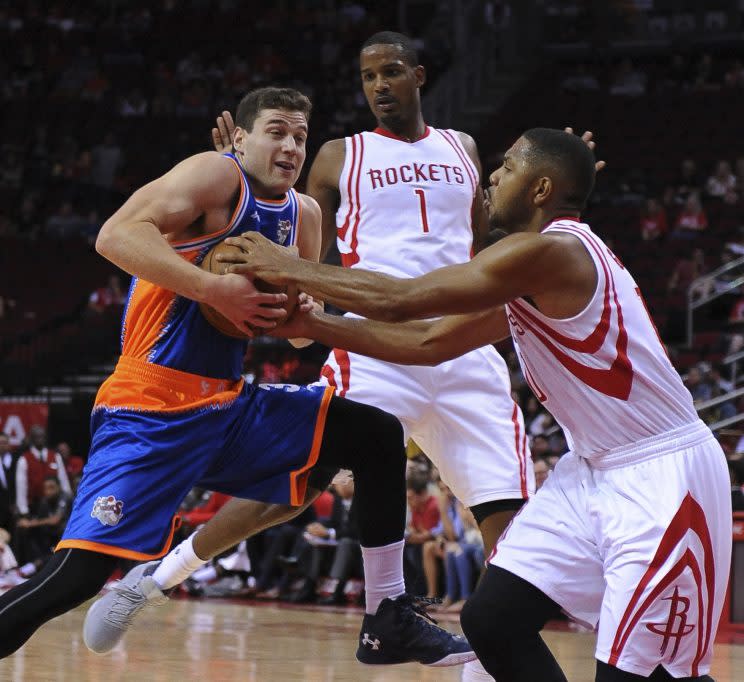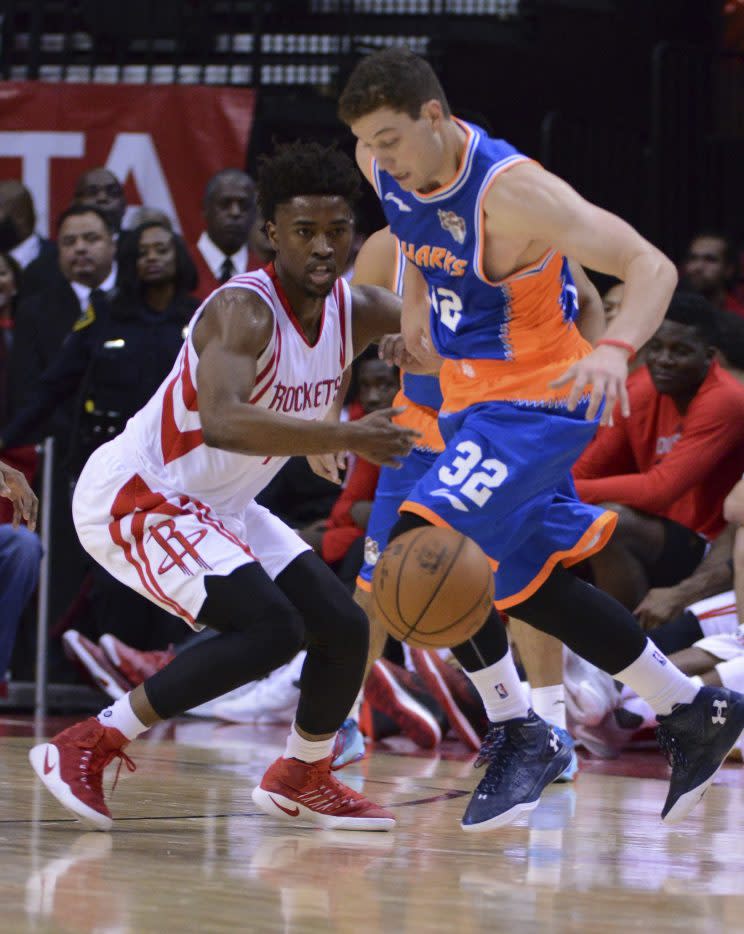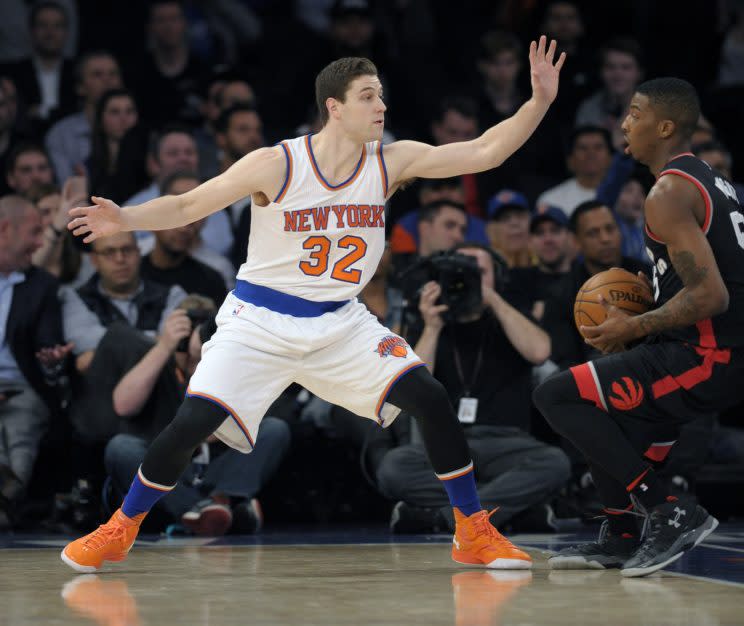The second act of Jimmer Mania
Jimmer Fredette is a sensation again. He hadn’t expected this to happen, certainly not in Shanghai, where he signed to play for one of the Chinese Basketball Association’s worst teams. But then came the 40-point nights, Shanghai’s unexpected rise from the bottom to the top and another group of fans halfway around the world was chanting his name.
“Jimo. Jimo. Jimo.”
There is no Chinese way to say “Jimmer,” his translator told him. They are using the word that sounds closest.
It means “lonely,” the translator added.
At first, Fredette was disappointed.
“I thought, ‘Lonely? That’s kind of depressing,’ ” he told The Vertical.
But the translator went on to explain that the conversion from Mandarin to English is not perfect, that the fans were not chanting “lonely” but rather something like “loneliness master” or “loneliness god.” They were saying he stood at such a high level, alone at the top, that he had no enemies. He was, in a sense, the very best.
Fredette’s Shanghai teammates later confirmed this to him, as did aides from his agent’s office. Suddenly Jimo didn’t sound depressing at all.
“Obviously, it’s a huge honor that I can hold on to,” Fredette said. “Now I love it.”
It shouldn’t be a shock that he has become a sensation in Shanghai, averaging a league-leading 37 points per game. His story in America was always larger-than-life. Why wouldn’t it be the same in China? While he is hardly the first NBA player to go there and score lots of points, he is one of the few who has made a difference in his city. He has done more than make baskets. He has helped turn one of the CBA’s worst teams into the best. And many must have wondered if that were possible.
The Shanghai Sharks have not been good for a long time, making the playoffs just three times since winning the league in 2002. Last season, they finished in a three-way tie for 10th in a 20-team league. Financial problems almost drove them out of business in 2009, surviving only when Yao Ming stepped in to run the franchise. That the Sharks are now 25-6 and tied for first with only a handful of games left in the regular season is something of a miracle. A big reason for that turnaround is Fredette.
He didn’t know much about Shanghai’s history when he signed with the team in early August. He had never been to China. At the time he was less than a month removed from a week in the NBA’s Summer League in which he didn’t shoot well. Though an NBA team was interested in bringing him to camp with a legitimate shot of making its roster, league sources said, Fredette took the guaranteed money in a league where the best players can make up to $3 million a year. All he understood about the Shanghai Sharks was that Yao ran the team and that Yao had a reputation for being honest and treating his players well.
When Fredette arrived in the fall, Yao asked him if he could be a leader for a mostly young team he had assembled. “Show them how to be professional,” Fredette remembers Yao saying. The coach, Yuenan Ma, put him at point guard and designed an offense that would allow him to score. And if there were one thing Fredette could always do, it was score.
“I think it’s just being able to go out and play and obviously having the green light to go out there and score the basketball and just do what you do on the court,” Fredette told The Vertical when asked how he has been able to adapt to the Chinese game so quickly. “I know if I have that confidence to be able to go out and shoot – and I’ve always been like that since growing up – I know I will have an opportunity to play and I have an opportunity to shoot the basketball.”
While many players go overseas with the intent of scoring lots of points and collecting a check, they often don’t understand the complexity of becoming part of that team’s history. They know little about their new fans’ joys and disappointments. Trying to fit into that legacy is difficult enough for an imported rental player. Affecting change is difficult.
Fredette went to China hoping, at 27, to extend his career, which had slowed in the U.S., and to see what it was like playing in another country. While he could have imagined scoring 37 points a game, he couldn’t have grasped what it means to turn Shanghai into a title contender.
“I play a lot of minutes over here and have scored a lot, and it’s great to be able to do that, but our team has been winning and that’s been really great,” he said. “We have a good group of guys who play hard and I’m grateful for the opportunity. It’s been great for me.”
Yao’s words seem to have had an impact on Fredette. He had been the obvious leader of his high school team in Glens Falls, N.Y., and also at BYU where he was college basketball’s top player in 2011 when he became a national phenomenon. But in the NBA he was always one of the younger players, usually clinging to a roster spot. His role didn’t call for inspiring teammates. His biggest mandate was to fit in.
In Shanghai, Yao was asking him to pull his teammates along. At first this was a challenge. While the other players spoke some English, many didn’t speak it well enough to hold long conversations. All his talks with Ma were done through a translator.
He could be a good teammate, though. He could show up early to practice and take extra shots, hoping the others would follow. If another player did something particularly well, he could tell his translator to compliment the player and explain what he had done right. He could say to his teammates that if they saw themselves getting better each day, the team would as well. So he did those things. And the team did get better.
“In basketball, 80 percent of the communication is non-verbal,” he said.
With the winning and the big scoring nights, including 51 points against Guangdong in November, came the mob of fans. This is not a new experience for American stars in China. Several, including Kobe Bryant and Stephon Marbury, are beloved there and draw mobs of admirers. Tracy McGrady, the two-time NBA scoring champion who played in China at the end of his career and still does frequent business in the country, once told me about the crowds of fans that would fill hotel lobbies and line up outside stores where he made appearances just to get a glimpse of him. Years later, the experience continued to amaze him.
But then McGrady added this.
“I know how genuine [the Chinese fans’ affection] is, but if you are a phony you won’t get it,” he said.
Fredette, with his dimpled smile and aw-shucks shrug, has never come off as phony. In Shanghai he’s worked hard to assimilate into the culture, taking walks around his neighborhood and riding the subway. He learned that people appreciated him using even the most basic Chinese words. He began greeting people not with “hello” but ni hao.
Now he hears Jimo everywhere. When fans voted for All-Stars, he and Marbury were the only Americans chosen to be starters. That he is 6-foot-2 and isn’t fast and otherwise screams anything but an elite-looking athlete have only increased the mania. Part of Fredette’s popularity is that he doesn’t look like someone who can score 37 points a night, so when he does the moment is all the more amazing.
He can make millions in endorsements in China. With 1.3 billion people in a country that often looks to the West for its cultural influences, China is a blank slate for Fredette, especially if he signs another contract with Shanghai.
And that’s where things get complicated. While it is clear that Fredette has loved his time in China, he has never let go of the NBA. Though he only played six NBA games in 2015-16 and was released twice, he still believes he can not only make an NBA roster but also stick with a team and make significant contributions. He has tempered old expectations of stardom and 20-point nights to push a role as a sixth man, what he calls “an energy-type guy who can come off the bench and score the basketball.”
NBA teams have been skeptical of Fredette’s ability to do this. One scout at Summer League wondered why Fredette just didn’t go to Europe where the other players are a step slower and he can make a nice living scoring at will. But that was before Fredette went to Shanghai and became a sensation.
“That’s a great question,” Fredette said when asked about the NBA. “I’m not 100 percent sure. Obviously, I’m from the USA and the NBA is the greatest league in the world, and if I have the opportunity to play in the NBA that’s where I would love to play.
“But China is a great opportunity. The fans have been great to me, more than I can imagine, especially in such a short amount of time. It’s a good league over there, and there are some changes coming, good changes for the league, and I think there’s an amazing opportunity to make a great living, to make a lot of money.”
Despite its popularity in China, the CBA is a rudimentary league, still just 21 years old. That is changing, however. A new television deal should be negotiated soon along with new apparel contracts that can make playing in China even more lucrative for foreigners. Unlike McGrady or Kenyon Martin and other NBA stars who went there at the end of their careers and were shells of their former selves, Fredette should have many successful years left. If he decides to stay, he can become a face of Chinese basketball.
There is a lot to consider. Fredette’s wife, Whitney, is eight months pregnant with their first child, a girl. She came to Shanghai for a few weeks last fall before her pregnancy forced her home. He said she enjoyed the city as much as him, but he said he has missed her. Could they go back and forth to Shanghai with an infant? Do they want to live apart for nearly six months while he plays in China? These are questions they have to answer soon.
For now, though, the playoffs await. The CBA season is in its final days and as a postseason favorite Shanghai finds itself in an unusual position. Teams have been throwing all kinds of defenses at Fredette, forcing him to slide between playing point guard and moving at times to an off-guard role. At times, he has had the ball in his hands, at others he has been catching and shooting, and still others, rolling around screens. Defenses only will get trickier in the playoffs and expectations will be bigger than they have been in this improbable year for the Sharks.
If Shanghai can win a championship, or even make a deep run, Fredette has the potential to make millions in China’s largest and wealthiest city. He can be bigger there than he was his last year at BYU, when he was a highlight-show staple and crowds everywhere buzzed with shouts of “Jimmer!” Sometimes life takes you strange places. He couldn’t have seen all this six years ago, when he was drafted in the lottery between All-Stars Kemba Walker and Klay Thompson. Back then, he would have assumed to have at least a solid NBA career by now. Not that he’d be a Chinese scoring sensation.
“I learned a lot about myself,” he said of his time so far in Shanghai. “You learn you can do things on your own and experience life in another country and enjoy culture. I’ve learned a lot about the Chinese people and the culture, and some things that I never thought I would have an opportunity to know about.”
Like how to be the loneliness master halfway around the world.
More NBA coverage from The Vertical:




